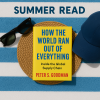news
A Summer Read for Supply Chain Learners: 'How the World Ran Out of Everything' by Peter Goodman
Primary tabs
I want to recommend a book that I think is especially timely for anyone working in, studying, or simply trying to understand today’s supply chain landscape. Peter Goodman’s How the World Ran Out of Everything takes you inside the global disruption we all lived through — but it also challenges some of the assumptions we've made about how supply chains are supposed to work.
This isn’t a technical manual. It’s a well-researched, human story — with frontline accounts from truckers, factory workers, port operators, and business leaders — and it puts real names and faces behind the headlines. For those of us who’ve been in this field for a while, many of the companies and consultants referenced will be familiar. I’ve worked in and with those same types of organizations, and I’ll say this plainly: so much of what happens in supply chains comes down to incentives. And that’s a thread this book pulls on again and again.
Why I Think It’s Worth Reading Now
It lays bare the tension between short-term profitability and long-term resilience.
That balance is hard — even for well-run companies. This book doesn’t offer easy answers, but it helps you see the tradeoffs more clearly.
It’s realistic about reshoring and nearshoring.
Yes, they’re happening. But unless you’re Walmart or a top-tier buyer, they’re not easy plays. The book does a good job showing why that’s true.
It tackles the complexity of working with China.
Like many of you, I’ve been in conversations where we talk about moving away from China — and then realize how difficult (and costly) that would be. This book captures that paradox well: we can’t live with them, but we can’t live without them either.
It reminds us that behind every system are people.
This part resonated with me. From seafarers stuck at sea to small businesses trying to stay afloat, it brings the human side of supply chain to the forefront.
Who Might Enjoy This
- Practitioners thinking about how to build more resilient systems
- Early-career professionals who want to see how theory meets practice
- Anyone who wants a thoughtful, readable entry point into the “why” behind the supply chain headlines
As we explore new solutions — whether AI, circular supply chains, or new sourcing strategies — it's worth pausing to ask: what were we solving for before? And are the incentives any different now?
This is a good summer read to help frame that discussion.
Status
- Workflow status: Published
- Created by: Andy Haleblian
- Created: 06/23/2025
- Modified By: Andy Haleblian
- Modified: 08/22/2025
Categories
Keywords
User Data


